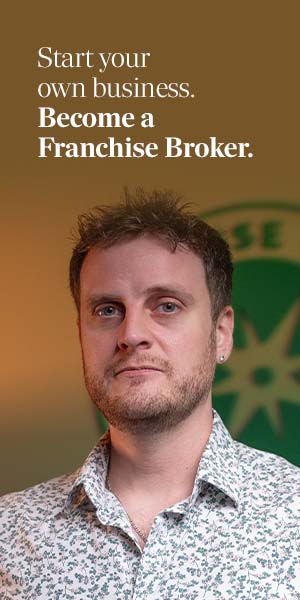What if the real force behind today’s most successful franchise expansions wasn’t the brand itself—but a skilled strategist working behind the scenes—someone like a franchise broker?
In the intricate world of franchising, where more than 805,000 U.S. franchise establishments compete for growth and market share, the unsung heroes driving development are often franchise brokers. These professionals, also known as franchise consultants, act as deal architects—methodically designing pathways to growth that benefit franchisors, franchisees, and the industry at large.
As deal conversion rates decline and lead costs soar, franchise brokers have emerged as indispensable players in the modern business development landscape.
What Do Franchise Brokers Actually Do?
A franchise broker isn’t just a salesperson pushing brands. They are strategic intermediaries who act as advisors, analysts, and matchmakers. Their role includes:
- Evaluating franchise brands for quality, growth potential, and alignment with market demand.
- Pre-qualifying franchise candidates and preparing them for the investment journey.
- Guiding clients through due diligence, funding options, and decision-making.
- Managing introductions, negotiations, and post-sale support to ensure success.
This multifaceted role enables brokers to connect high-intent candidates with vetted brands while ensuring all parties understand expectations, legal commitments, and operational responsibilities. Think of it as advisory matchmaking, with lasting consequences for all stakeholders.
The Rise of the Broker as a Business Development Strategist.
As franchisors face inflation, labor shortages, and diminishing returns on digital ads, many are shifting toward broker-led development pipelines. Industry data from Franchising.com and the Franchise Brokers Association (FBA) suggests that:
- Franchise broker leads tend to convert at significantly higher rates than traditional digital channels
- Some major brands attribute a notable percentage of their new franchise placements to broker partnerships
- Leading brands increasingly allocate premium budgets to broker channels, reflecting their growing strategic value
These insights reflect the evolving status of franchise brokers as efficient, targeted growth partners. Unlike broad advertising, brokers deliver candidates who are often pre-qualified, coachable, and aligned with a brand’s culture and vision.
Why the Franchise Broker Career Attracts Strategic Professionals.
Franchise brokers operate at the crossroads of strategy, communication, and business growth—making the role highly attractive to professionals who enjoy solving complex challenges and driving meaningful outcomes.
They thrive in these core areas:
- Business Development: Brokers help franchise brands grow in a focused and sustainable way, aligning new units with long-term goals and market demand.
- Financial Advisory: While not financial advisors, brokers guide candidates in understanding startup costs, profitability timelines, and overall investment readiness.
- Consulting & Coaching: They support clients in aligning personal goals with the right business models, offering clarity and confidence during the decision-making process.
- Negotiation & Deal Structuring: Brokers coordinate transparent conversations between franchisors and candidates, ensuring clear expectations and smoother agreements.
This unique blend of roles appeals to professionals from finance, operations, sales, and entrepreneurial backgrounds—especially those who enjoy crafting strategic deals with long-term impact..
What Are the Startup and Certification Costs for Franchise Brokers?
Becoming a certified franchise broker requires some initial investment. Here’s a realistic breakdown of startup costs:
| Cost Category | Low Estimate | High Estimate |
|---|---|---|
| Franchise Training Institute (FTI) Certification | $9,995 | $12,500 |
| CRM & Lead Management Tools (Annual) | $1,500 | $3,000 |
| Website & Branding | $1,000 | $3,000 |
| Initial Marketing Budget | $2,000 | $5,000 |
| Home Office Setup (Optional) | $500 | $2,000 |
Tip: Most brokers recoup these costs within their first few placements.
The Strategic Influence of Franchise Brokers on Brand Growth.
Franchise brokers do far more than introduce candidates to franchise brands. They act as strategic filters and relationship architects—protecting both parties from costly mismatches and accelerating the sales process with clarity and precision.
By guiding prospective franchisees through every critical step, franchise brokers help brands expand with confidence. Their expertise reduces inefficiencies and enhances candidate quality, ensuring every placement supports long-term brand strength.
Here’s how franchise brokers create strategic value:
- Interpreting Franchise Disclosure Documents (FDDs): Franchise brokers help clients navigate the complex legal and financial disclosures found in the FDD. They clarify key sections—such as fees, financial performance representations, and franchisee obligations—so buyers can ask informed questions before involving legal counsel.
- Matching Candidate Profiles to Brand Culture: Beyond financial qualifications, brokers assess soft factors like personality, work style, and values. They ensure that the candidate’s vision aligns with the franchisor’s culture, expectations, and operational demands—greatly improving retention and performance over time.
- Coordinating Discovery Days and Key Meetings: Discovery days are pivotal moments in the franchise journey. Brokers prepare candidates for productive conversations with franchisors, coordinate schedules, and ensure both sides are aligned on what success looks like before any commitment is made.
- Facilitating Territory and Startup Discussions: Franchise brokers help both parties navigate territory mapping, market saturation concerns, and launch timelines. By setting realistic boundaries and expectations early, they minimize misunderstandings and keep deals on track.
Expanding Support Beyond the Sale.
According to industry insights from FasterCapital and Reidel Law Firm, many franchise brokers now contribute to:
- Due diligence support – ensuring candidates ask the right questions and understand key risks
- Training coordination – helping franchisees prepare for onboarding and pre-opening operations
- Site selection guidance – connecting candidates with real estate professionals or helping assess local markets
These responsibilities were once handled exclusively in-house. Today, franchise brokers serve as collaborative partners in the entire development lifecycle, from first contact to grand opening.
Types of Support Models Available for New Franchise Brokers.
There’s no one-size-fits-all launch path. Aspiring franchise brokers can choose from:
| Support Model | Included Features |
|---|---|
| Affiliate with a National Broker Network | Leads, training, CRM, templates |
| Join an Established Franchise Brokerage | Branding, mentorship, shared deal flow |
| Launch as an Independent Consultant | Total control, personal branding, self-sourced leads |
Each model has pros and cons depending on how much support and autonomy a broker desires.
Common Misconceptions About Franchise Brokerage.
Although the role of franchise brokers is growing in relevance and sophistication, misconceptions still persist. These misunderstandings often stem from outdated views or assumptions about what brokers actually do.
Let’s clear the air by debunking a few common myths:
Myth: “Franchise brokers just hand out brochures.”
✅ Fact: Franchise brokers are not sales reps or middlemen handing out pamphlets.
They guide clients through a multi-week consultative journey that includes financial analysis, legal reviews, territory mapping, and personal goal alignment. Brokers often act as strategic advisors, helping candidates avoid missteps and understand the depth of commitment required to own a franchise. Their role is far more nuanced than simply presenting options.
Myth: “You need to own a franchise to become a broker.”
Fact: Prior franchise ownership can help, but it is not a requirement.
Most successful franchise brokers come from varied backgrounds—finance, sales, real estate, operations, or entrepreneurship. What matters most is the ability to listen, advise, and problem-solve. With the right training and certification from credible organizations, new brokers can gain all the tools they need to enter the field confidently.
Myth: “Franchise brokerage is just a sales job.”
Fact: While communication and persuasion are part of the job, franchise brokers function more like business consultants than traditional salespeople.
They assess candidate fit, provide education on franchise models, help interpret financial documents, and act as neutral guides through a complex decision-making process. Many brokers describe themselves as coaches, researchers, and risk mitigators who prioritize long-term fit over short-term gain.
Strategic, Not Transactional.
The truth is, franchise brokers play a critical role in the success of both franchise brands and buyers. They act as educators, advocates, and strategists—ensuring that placements are well-aligned, informed, and sustainable. As the franchising landscape becomes more competitive and more complex, their value continues to grow.
The Future of the Franchise Broker Career Path.
Franchise brokers are entering a golden era. Three trends are converging in their favor:
- Franchisors are outsourcing development: In-house sales teams are being replaced by trusted broker networks.
- Investors want personalized guidance: Buyers are seeking advisors, not ads.
- Franchise transparency is increasing: Ethical brokers who align the right people with the right brands are in high demand.
According to the IFA, the U.S. franchise sector is projected to grow nearly 4% annually, creating more demand for skilled franchise brokers who can help navigate complexity.
What Makes a Great Franchise Deal Architect.
Effective franchise brokers, often referred to as “deal architects,” bring a unique blend of experience and personal qualities that enable them to guide clients through complex decisions with clarity and confidence.
Common Backgrounds.
Franchise brokers often come from:
- Finance or banking – Comfortable with investment analysis and financial planning
- Real estate or commercial leasing – Experienced in negotiations and market evaluation
- Entrepreneurship or franchise ownership – Understand the mindset and needs of owners
- Consulting, HR, or training – Skilled at coaching and guiding people toward long-term goals
Key Traits.
Regardless of background, top-performing brokers typically share:
- Emotional intelligence – The ability to listen, understand motivations, and build trust
- Integrity – A commitment to ethical guidance and client-first decision-making
- Analytical thinking – Strong research skills and attention to detail
- A passion for helping others – Motivation to support clients in building successful futures
Franchise brokers who combine strategic insight with these human-centered traits are well-positioned to succeed and make a meaningful impact.
Charting Your Own Path as a Franchise Development Strategist
If you’re a professional seeking freedom, impact, and strategic influence, becoming a franchise broker could be your next great move.
It’s a business model that rewards intelligence, empathy, and persistence. You’ll help people change their lives while building your own income and flexibility.
Start your journey today with the Franchise Training Institute.




















